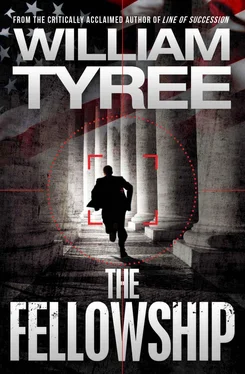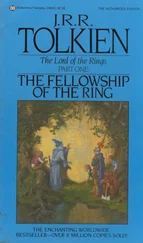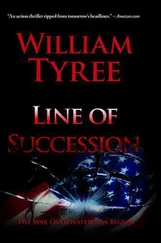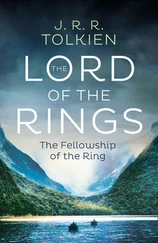William Tyree - The Fellowship
Здесь есть возможность читать онлайн «William Tyree - The Fellowship» весь текст электронной книги совершенно бесплатно (целиком полную версию без сокращений). В некоторых случаях можно слушать аудио, скачать через торрент в формате fb2 и присутствует краткое содержание. Год выпуска: 2013, Издательство: Massive, Жанр: Триллер, на английском языке. Описание произведения, (предисловие) а так же отзывы посетителей доступны на портале библиотеки ЛибКат.
- Название:The Fellowship
- Автор:
- Издательство:Massive
- Жанр:
- Год:2013
- ISBN:нет данных
- Рейтинг книги:5 / 5. Голосов: 1
-
Избранное:Добавить в избранное
- Отзывы:
-
Ваша оценка:
- 100
- 1
- 2
- 3
- 4
- 5
The Fellowship: краткое содержание, описание и аннотация
Предлагаем к чтению аннотацию, описание, краткое содержание или предисловие (зависит от того, что написал сам автор книги «The Fellowship»). Если вы не нашли необходимую информацию о книге — напишите в комментариях, мы постараемся отыскать её.
The Fellowship — читать онлайн бесплатно полную книгу (весь текст) целиком
Ниже представлен текст книги, разбитый по страницам. Система сохранения места последней прочитанной страницы, позволяет с удобством читать онлайн бесплатно книгу «The Fellowship», без необходимости каждый раз заново искать на чём Вы остановились. Поставьте закладку, и сможете в любой момент перейти на страницу, на которой закончили чтение.
Интервал:
Закладка:
Bruno Fleischer stood at the stern, wearing a thick overcoat that, on such a cold evening, was the envy of every boy in the unit. Their leader had kept details of the mission to himself. The stern resolve he now possessed had come about gradually. They had traveled two days by train, coming south through Frankfurt, by way of Munich, through the Alps. Bolzano, Innsbruck, Verona. And finally, Venice. Throughout, the fantasy of holding the skull of Jesus Christ in his hands had grown on Fleischer. During the train ride to Italy Wolf had watched him fill the notebook in his pack with dozens of sketches. He talked excitedly of measuring the roundness of the cranium and presenting his findings to Hitler personally. Fleischer was already the most famous racial researcher in Germany. Soon he would be the most famous anthropologist in the world. “When the new German Gospels are written,” he told Wolf, “perhaps I will be credited as an author? Just imagine it. My name would be learned by German schoolchildren for the next thousand years.”
With each passing hour, Wolf felt more certain that the ossuary must be kept out of Fleischer’s reach. It had been Lang who had first broached the idea. Just after the train departed Bolzano Station, Lang had followed Wolf into the lavatory, jamming his foot into the door, wedging his way inside. Although they had been virtually inseparable at Wewelsburg Castle, the two old friends had not spoken privately since Christmas.
Lang had stood with his back against the train door, his face deadly serious, speaking just loudly enough to be heard over the sound of the track. “Do you believe it exists?”
A question with so many possible meanings. And yet no translation was needed. He spoke of the ossuary, obviously. The same thing that was on everyone’s mind.
“I think it’s possible,” Wolf admitted. He was just as surprised to hear the words come out of his mouth as Lang was. “What if it happened the way Seiler described?”
Lang’s eyes flashed in judgment. Looking back over the past months, it was obvious that Albert’s death had formed the first wedge in their friendship, and Lang’s cowardice in Paris had driven them further apart.
“You sound like a heretic,” Lang whispered.
“If it’s not real,” Wolf retorted, “what were those monks in Paris fighting for?”
“I don’t know.”
“They must have believed. If they’re right, and I am right, then you’re the heretic.”
Lang swallowed hard, his small eyes seeming to condemn his friend to eternal hellfire. “Either way, they can’t be allowed to possess it.”
At last someone else had said what Wolf had been thinking. Himmler’s collection of stolen Christian art was simply repugnant. But the thought of the body of Christ taken to a crypt some 800 meters below the earth — where it would lay alongside Von Hindenburg and Adolf Hitler for all of eternity — was intolerable. Himmler was unworthy. The entire country was unworthy.
But there were other considerations. There were lives at stake. Potentially millions of lives. “Maybe they will really use it to end the war,” Wolf said.
Lang shook his head. “If they believe they have found the Aryan Jesus, they will only use it as justification to kill more Russians. And more Jews.”
There was no use denying it. Lang was right. “What should we do?” Fear prickled up Wolf’s spine as he asked. He had the feeling neither of them would ever see their mothers again.
*
The boat passed under the Rialto Bridge, cutting through the patchwork of fog hovering over the canal. In the dim lamplight, Wolf caught his first glimpses of the crumbling city. Walls that looked as if they had not been painted in centuries. Cafes that seemed as if they had been there since the beginning of time. Figures in heavy coats and fur hats that could have been ghosts from any point in history.
But Wolf could not enjoy Venice’s shadowy old world charm. His mind was cluttered with uncertainty. How was Lang going to keep the ossuary out of German hands? Was he going to sabotage the operation?
Now Fleischer turned and whistled, pointing at Wolf. The boy got to his feet, walked to the boat’s stern, and stood next to the driver in the boat’s open air cockpit. The captain held the wheel with his right hand and operated a spotlight — which only seemed to magnify the soupy fog in the canal — with his left. A hand-rolled cigarette hung from the corner of his mouth, burning unevenly.
“I need you to translate,” Fleischer said. Wolf was more than eager. Like all the boys, he was starved for information. Fleischer had revealed no mission details whatsoever. Even their destination had been in doubt until they had changed trains in Verona. “Tell him we’re looking for a place called Gritti Palace.”
Wolf introduced himself to the driver, who, judging by his devil-may-care attitude, had obviously ferried his fair share of Nazis around the local waterways. He showed no fear of the black uniform. The middle-aged Venetian kept his eyes forward as he answered Wolf’s questions, speaking as little as possible.
“He says the Gritti Palace is a hotel along the Grand Canal,” Wolf told Fleischer. “Very close.”
Fleischer nodded, seeming to be encouraged by the news. “Now ask him how close it is to the Basilica of San Marco.”
Wolf had learned about San Marco from his history classes with the Jesuits. It was said to be an ancient Byzantine-style church built in 1071 AD. It had been there, some 500 years after its creation, that Pope Paul III had recognized the Jesuits as an official religious order.
The question seemed to puzzle the driver. “San Marco is only a few minutes’ walk from Gritti Palace. But why would you go there? I thought you people did not believe in God.”
You people. Millions of Catholics and Lutherans. Centuries of Christian tradition had been eclipsed by a mere decade of national socialism.
The driver glanced right, squinting at Wolf’s face in the yellow luminosity radiating from the spotlight. “How old are you, anyhow?”
“Old enough.”
The boatman shook his head. “At your age, you should be chasing girls.”
“No,” Wolf said. “I was meant to do this.”
His own words surprised him, but he knew they were true. When he had been drafted into the Ahnenerbe two years ahead of schedule, he had felt victimized. They had promised him a life in academia, and he had instead been issued a rifle and marked with the tattoos of the SS. In Paris he had been thrust into a hidden conflict without any moral or practical compass. But now he was filled with the unmistakable sense of belonging. The future of Europe was at stake. The future of Christianity was at stake. And he had been placed in the center of the battle for the hearts and souls of Europe. He glanced skyward. Use me, he thought. Please. Use me.
*
A bellman in thigh-high waders stood waiting at the dock outside the Gritti Palace. He fastened a rope to one of the boat’s anchors and offered Fleischer a hand as he stepped out of the watercraft and onto the wood planking. Wolf was next. His sore left shoulder ached as he locked hands with the bellman and pulled himself out of the watercraft. He gazed up at the faded frescoes adorning the hotel’s 15th-century facade. The Palace, which was now a hotel, had been built in 1552 as the residence of Doge Andrea Gritti. It now flew the flag of Fascist Italy.
A concierge in a tuxedo greeted them at the entrance, which was tiled with black and white marble and adorned with large mirrors with gilded framing. Fleischer introduced himself. “Ah, Professor,” the man exclaimed in perfectly enunciated German. “We expected you yesterday.”
“Italian trains,” Fleischer said dismissively. “My error was assuming they would run on schedule.”
Читать дальшеИнтервал:
Закладка:
Похожие книги на «The Fellowship»
Представляем Вашему вниманию похожие книги на «The Fellowship» списком для выбора. Мы отобрали схожую по названию и смыслу литературу в надежде предоставить читателям больше вариантов отыскать новые, интересные, ещё непрочитанные произведения.
Обсуждение, отзывы о книге «The Fellowship» и просто собственные мнения читателей. Оставьте ваши комментарии, напишите, что Вы думаете о произведении, его смысле или главных героях. Укажите что конкретно понравилось, а что нет, и почему Вы так считаете.











